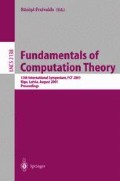Abstract
In this paper we propose an advanced randomized coloring algorithm for the problem of balanced colorings of hypergraphs (discrepancy problem). It allows to use structural information about the hypergraph in the design of the random experiment. This yields colorings having smaller discrepancy than those independently coloring the vertices. We also obtain more information about the coloring, or, conversely, we may enforce the random coloring to have special properties. Due to the dependencies, these random colorings need fewer random bits to be constructed, and computing their discrepancy can be done faster. We apply our method to hypergraphs of d-dimensional boxes. Among others, we observe a factor 2d/2 decrease in discrepancy and a reduction of the number of random bits needed by a factor of 2d.
Since the discrepancy problem is a particular rounding problem, our approach is a randomized rounding strategy for the corresponding ILP-relaxation that beats the usual randomized rounding.
supported by the graduate school ‘Effiziente Algorithmen und Multiskalen-methoden’, Deutsche Forschungsgemeinschaft
Access this chapter
Tax calculation will be finalised at checkout
Purchases are for personal use only
Preview
Unable to display preview. Download preview PDF.
References
N. Alon and J. Spencer. The Probabilistic Method. John Wiley & Sons, Inc., 2nd edition2000.
J. Beck and T. Fiala. “Integer making” theorems. Discrete Applied Mathematics, 3:1–8, 1981.
L. Babai, T. P. Hayes, and P. G. Kimmel. The cost of the missing bit: Communication complexity with help. In Proceedings of the 30th STOC, pages 673–682, 1998.
J. Beck and J. Spencer. Integral approximation sequences. Math. Programming, 30:88–98, 1984.
B. Chazelle. The Discrepancy Method. Princeton University, 2000.
V. Chvátal. The tail of the hypergeometric distribution. Discrete Math., 25:285–287, 1979.
B. Doerr and A. Srivastav. Recursive randomized coloring beats fair dice random colorings. In A. Ferreira and H. Reichel, editors, Proceedings of the 18th Annual Symposium on Theoretical Aspects of Computer Science (STACS) 2001, volume 2010 of Lecture Notes in Computer Science, pages 183–194, Berlin-Heidelberg, 2001. Springer Verlag.
L. Lovász, J. Spencer, and K. Vesztergombi. Discrepancies of set-systems and matrices. Europ. J. Combin., 7:151–160, 1986.
J. Matoušek. Geometric Discrepancy. Springer-Verlag, Berlin, 1999.
K. F. Roth. Remark concerning integer sequences. Acta Arithmetica, 9:257–260, 1964.
A. Srinivasan. An extension of the Lovász local lemma, and its applications to integer programming. In Proceedings of the Seventh Annual ACM-SIAM Symposium on Discrete Algorithms (Atlanta, GA, 1996), pages 6–15, New York, 1996. ACM.
A. Srivastav. Derandomization in combinatorial optimization. In P. Pardalos, S. Rajasekaran, J. Reif, and J. D. P. Rolim, editors, Handbook of Randomization. Kluver, to appear in 2001.
J. P. Schmidt, A. Siegel, and A. Srinivasan. Chernoff-Hoeffding bounds for applications with limited independence. SIAM J. Discrete Math., 8:223–250, 1995.
W. Uhlmann. Vergleich der hypergeometrischen mit der Binomial-Verteilung. Metrika, 10:145–158, 1966.
B. L. van der Waerden. Beweis einer Baudetschen Vermutung. Nieuw Arch. Wsk., 15:212–216, 1927.
Author information
Authors and Affiliations
Editor information
Editors and Affiliations
Rights and permissions
Copyright information
© 2001 Springer-Verlag Berlin Heidelberg
About this paper
Cite this paper
Doerr, B. (2001). Structured Randomized Rounding and Coloring. In: Freivalds, R. (eds) Fundamentals of Computation Theory. FCT 2001. Lecture Notes in Computer Science, vol 2138. Springer, Berlin, Heidelberg. https://doi.org/10.1007/3-540-44669-9_53
Download citation
DOI: https://doi.org/10.1007/3-540-44669-9_53
Published:
Publisher Name: Springer, Berlin, Heidelberg
Print ISBN: 978-3-540-42487-1
Online ISBN: 978-3-540-44669-9
eBook Packages: Springer Book Archive

